- An appraisal of India’s comparative advantage in information technology exports April 3, 2023
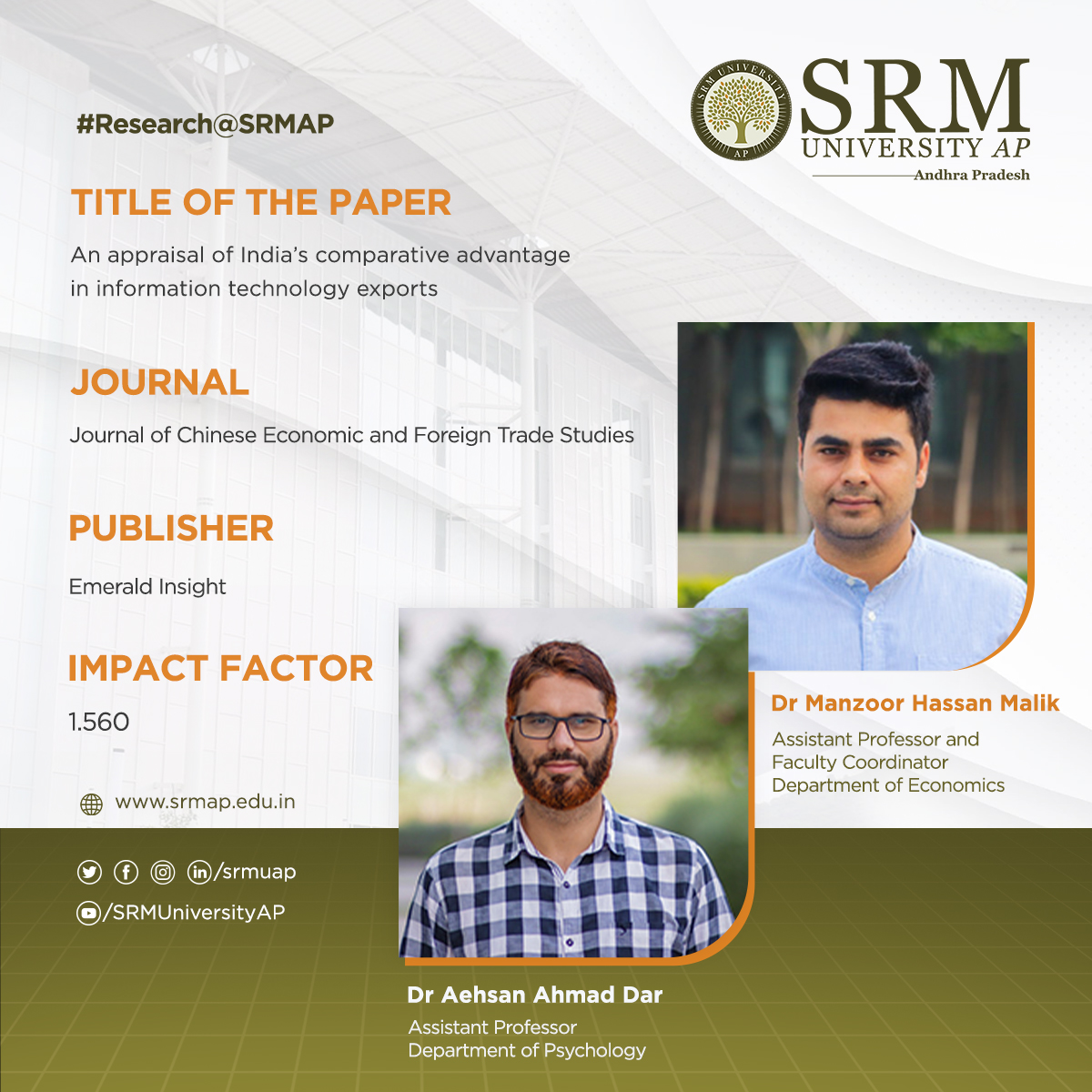 Researchers of the School of Liberal Arts and Social Sciences have worked on India’s comparative advantage in information technology exports with competing developing nations, including China, the Philippines, Malaysia, and Brazil. The latest paper published by Assistant Professor Dr Manzoor Hassan Malik, Department of Economics and Assistant Professor Dr Aehsan Ahmad Dar, Department of Psychology, has implications for attaining sustainability in IT export growth. It is suggested that policies are directed at enhancing the overall performance of the IT sector. The novelty of the present study lies in the estimation of India’s competitiveness in IT exports in relation to the group of reference countries, namely China, the Philippines, Malaysia, and Brazil. With its policy recommendations, this research is helping to shape the sustainability of the IT sector.
Researchers of the School of Liberal Arts and Social Sciences have worked on India’s comparative advantage in information technology exports with competing developing nations, including China, the Philippines, Malaysia, and Brazil. The latest paper published by Assistant Professor Dr Manzoor Hassan Malik, Department of Economics and Assistant Professor Dr Aehsan Ahmad Dar, Department of Psychology, has implications for attaining sustainability in IT export growth. It is suggested that policies are directed at enhancing the overall performance of the IT sector. The novelty of the present study lies in the estimation of India’s competitiveness in IT exports in relation to the group of reference countries, namely China, the Philippines, Malaysia, and Brazil. With its policy recommendations, this research is helping to shape the sustainability of the IT sector.The paper titled An appraisal of India’s comparative advantage in information technology exports was published in the Journal of Chinese Economic and Foreign Trade Studies with an impact factor of 1.560.
Abstract
The purpose of this study is to estimate revealed comparative advantage and Normalised Revealed Comparative Advantage (NRCA) indices of India’s Computer and Information Services (CIS) export competitiveness about Information Technology (IT) competing developing nations, such as China, Philippines, Malaysia and Brazil. Using annual data of total exports for CIS, transportation (TNS), travel (TVL) and insurance (INS) services under service categories of the balance of payment, the present study estimates the pattern of Comparative Advantage (CA) in India’s CIS exports with respect to IT competing developing nations such as China, Philippines, Malaysia and Brazil from 2000 to 2018. The choice of the study period is determined by the availability of consistent data on IT service exports of these nations. The study also estimates the export position of CIS export in comparison to India’s traditionally strong commercial services export of TNS, TVL and INS during the study period. Both indices showed that India had a strong CA in CIS compared to the selected nations, indicating India’s relative export performance to be stronger than that of China, Malaysia, the Philippines, and Brazil. The cross-service index showed that India’s relative specialisation level in CIS with respect to the world’s average specialisation level was stronger than its relative specialisation level in TNS, TVL and INS services. Furthermore, The NRCA cross-nation index showed that India’s NRCA index score has been declining since 2010 with respect to these nations, which implied a decline in the competitiveness of CIS. On the other hand, NRCA has increased in the case of the Philippines, Malaysia and Brazil for most of the period post-2010.
Continue reading → - Social Support and the Resilience Among Young Adults in Kashmir March 7, 2023
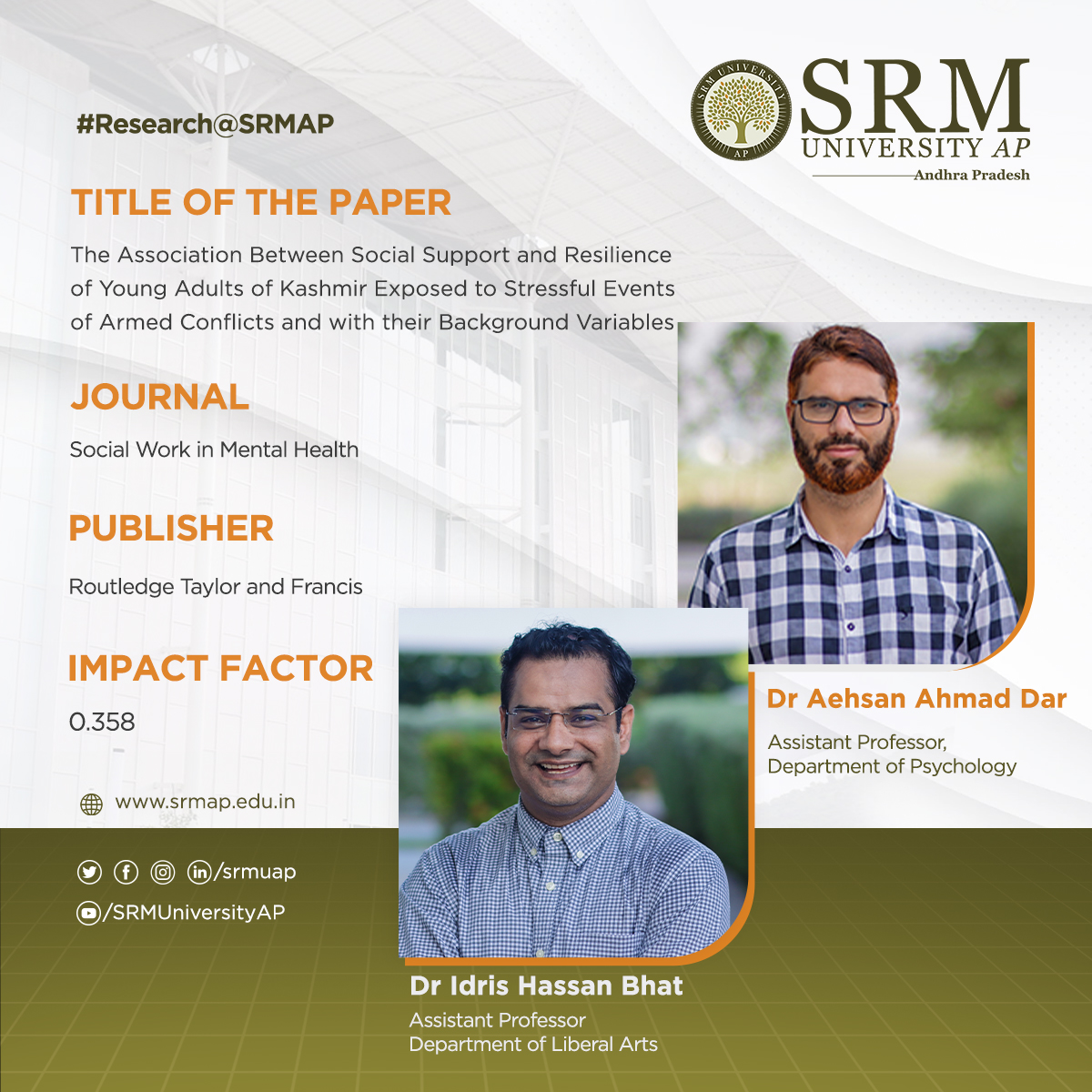 The latest research paper of Dr Aehsan Ahmad Dar, Assistant Professor, Department of Psychology, and Dr Idris Hassan Bhat, Assistant Professor, Department of Liberal Arts, examines the relationship between social support and resilience among young adults in Kashmir who have been exposed to the traumatic events of armed conflicts. His paper titled The Association Between Social Support and Resilience of Young Adults of Kashmir Exposed to Stressful Events of Armed Conflicts and with Their Background Variables was published in the esteemed journal Social Work in Mental Health, which is issued by the reputed publisher Routledge Taylor and Francis.
The latest research paper of Dr Aehsan Ahmad Dar, Assistant Professor, Department of Psychology, and Dr Idris Hassan Bhat, Assistant Professor, Department of Liberal Arts, examines the relationship between social support and resilience among young adults in Kashmir who have been exposed to the traumatic events of armed conflicts. His paper titled The Association Between Social Support and Resilience of Young Adults of Kashmir Exposed to Stressful Events of Armed Conflicts and with Their Background Variables was published in the esteemed journal Social Work in Mental Health, which is issued by the reputed publisher Routledge Taylor and Francis.Through the research, they found that social support plays a crucial role in enhancing the resilience of young adults and reducing the adverse effects of traumatic experiences. This publication is a significant contribution to the field of social work and mental health, particularly in the context of the ongoing conflict in Kashmir. The findings of the researchers highlight the importance of social support in promoting the mental health and well-being of individuals who have experienced trauma.
Abstract
The current study examined the association of social support and background variables with resilience among young adults exposed to traumatic and stressful events of armed conflict in Kashmir, India. Data were collected from 693 participants using a multi-stage sampling method. Findings revealed that social support and gender were positively associated with resilience, whereas education, income, and maternal education were negatively associated with resilience. Moreover, feeling insecure and psychologically distressed as a result of the conflict was negatively associated with resilience, whereas the perception that the Kashmir conflict would be resolved was positively associated with resilience. The findings suggest fostering resilience in this population.
Continue reading → - Estimating ACEs among Young Adults in Kashmir December 26, 2022
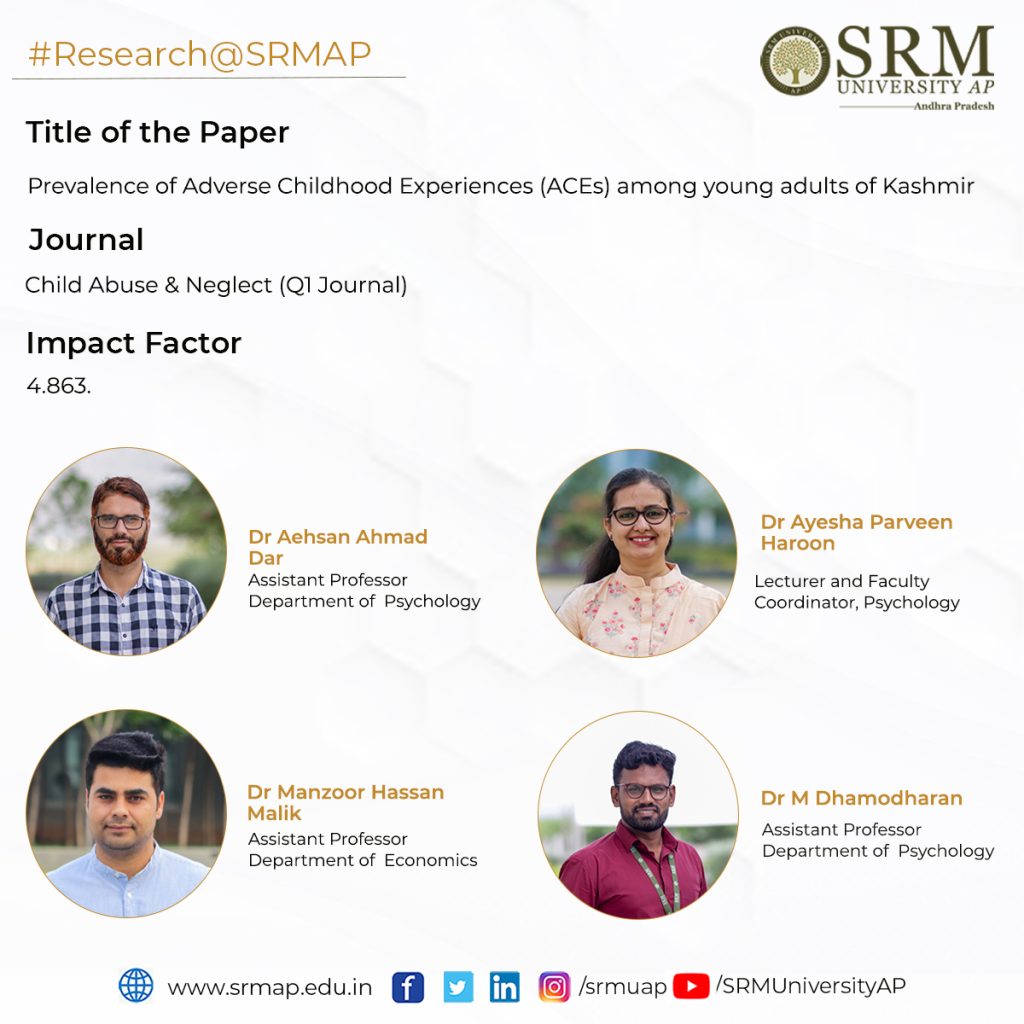
The Faculty of Psychology and Economics have jointly published a paper titled “Prevalence of Adverse Childhood Experiences (ACEs) among young adults of Kashmir” in the Q1 Journal Child Abuse & Neglect, having an impact factor of 4.863. Dr Aehsan Ahmad Dar, Assistant Professor, Department of Psychology; Dr Manzoor Hassan Malik, Assistant Professor, Department of Economics; Dr Ayesha Parveen Haroon, Lecturer, Department of Psychology; Dr Dhamodharan M, Assistant Professor, Department of Psychology have worked on interpreting the emotional constraints that are harboured among the young adults experiencing the adversities in turbulent Kashmir.
Abstract
The present study estimated the prevalence of ACEs among young adults studying in the colleges and universities of Kashmir, India. Findings disclosed that 15.4 % of the students reported high exposure to ACEs, 13.4% of the participants reported high exposure to ACEs, 26.3 % of the sample reported moderate exposure to ACEs, 33.0 % of the youth reported low exposure to ACEs and 11.8 % of the respondents reported no exposure to ACEs. The prevalence of ACEs was found to be 88.2 % (females: 82.7 % and males: 90.8 %) with a mean of 4.72 adverse events during childhood. The ACEs with the highest level of prevalence were “often or very often insulted or put down” (49.8 %), followed by “often or very often hurt physically” (47.6 %), “often or very often pushed, grabbed, or slapped” (41.6 %), “lived with a mentally ill household member” (28.3%), “touched or sexually fondled” (25.3 %),” household member being into the prison” (25.0%) and “witnessed father or mother being pushed, grabbed, slapped, or had something thrown at them” (24.0%).
Practical Implementation of the Research
The findings of the study will serve as a reliable source for healthcare professionals, policymakers and NGOs to better understand the impact of ACEs on the health and well-being of individuals. Since ACEs are associated with several immediate and long-term health hazards, therefore, necessary efforts in this direction are suggested to advocate the early targeted intervention to reduce ACEs and their impact as well as design effective measures to improve the health and well-being of young adults, thereby reducing the development of physical and mental disorders.
Collaborations
- Prof. Sibnath Deb, Rajiv Gandhi National Institute of Youth Development, Sriperumbudur, Tamil Nadu, India.
- Dr Manzoor Hassan Mali, Department of Economics, SRM University-AP, Andhra Pradesh, India
- Prof. Waheeda khan, Department of Clinical Psychology, Faculty of Behavioural Sciences, Shree Guru Gobind Singh Tricentenary University, Budhera, Gurugram, Delhi-NCR, India.
- Dr Ayesha Parveen Haroon, Department of Psychology, SRM University-AP, Andhra Pradesh, India
- Dr Amra Ahsan, Department of Clinical Psychology, Faculty of Behavioural Sciences, Shree Guru Gobind Singh Tricentenary University, Budhera, Gurugram, Delhi-NCR, India
- Dr Farhat Jahan, Department of Clinical Psychology, Faculty of Behavioural Sciences, Shree Guru Gobind Singh Tricentenary University, Budhera, Gurugram, Delhi-NCR, India
- Dr Bushra Sumaiya, Faculty of Education, Shree Guru Gobind Singh Tricentenary University, Budhera, Gurugram, Delhi-NCR, India.
- Shaheen Yawar Bhat, Department of Physiology, All India Institute of Medical Sciences, New Delhi, India.
- Dr Dhamodharan M, Department of Psychology, SRM University-AP, Andhra Pradesh, India
- Mohamad Qasim, Independent Researcher
The research cohort plans to study youth’s mental health and ascertain its risk and protective factors. About 19% of the world’s children live in India, which constitutes 42% of the total Indian population, and nearly half of these children are vulnerable and need care and protection. Due to various traumatic experiences, stress has increased among young people resulting in various physical and mental disorders.
The research will focus on the pathogenic (post-traumatic stress disorder, depression, anxiety, somatisation) and salutogenic (post-traumatic growth and resilience) consequences of trauma to help the youth withstand adverse experiences and develop psychological competence. The research will provide insights into the mental health of youth that would be helpful for the administration, policymakers, and other voluntary organisations to understand effective ways to devise and implement the best intervention programs for maximising mental health protective factors and minimising its risk factors.
Continue reading → - Mental health of school students during the COVID-19 pandemic in India September 20, 2022
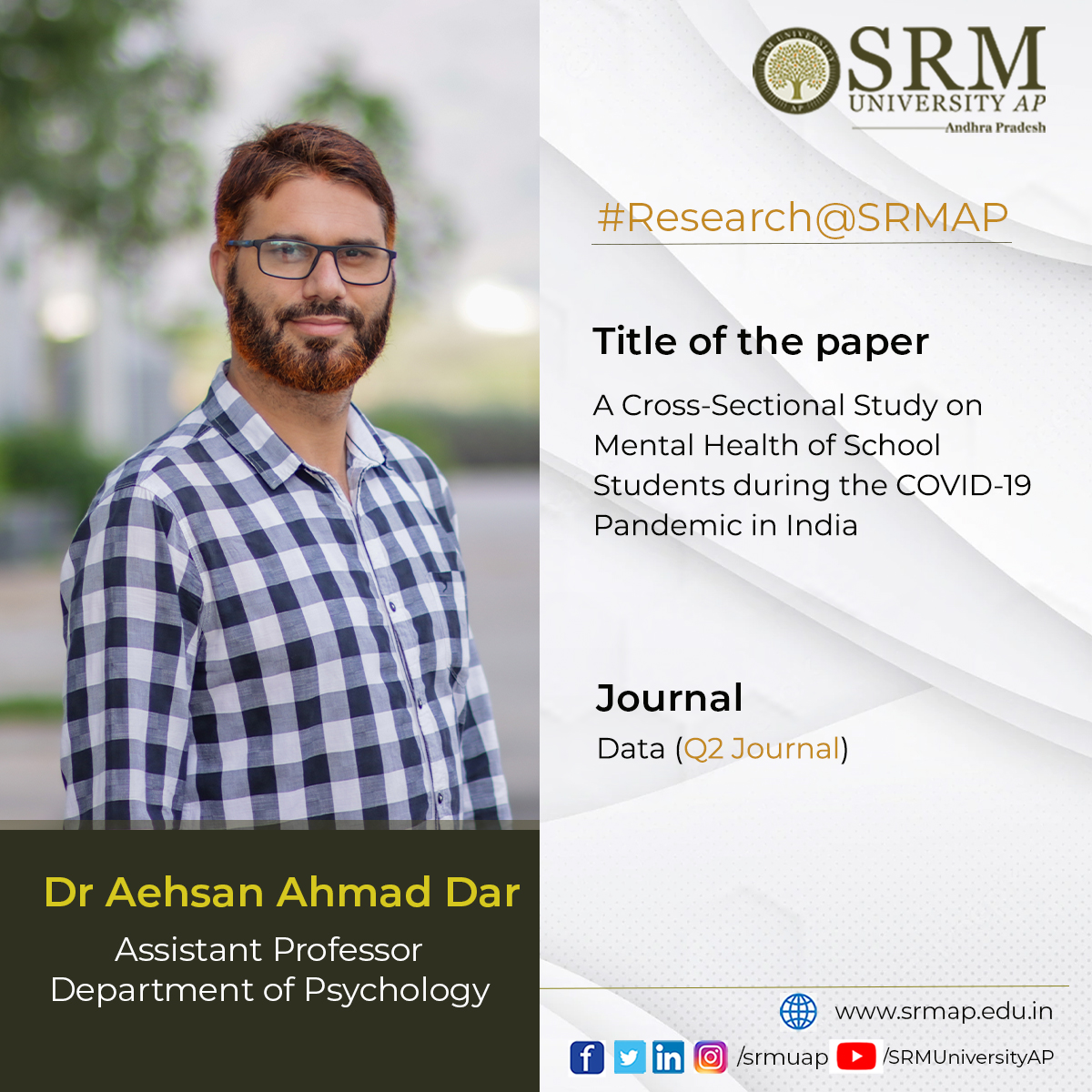
Dr Aehsan Ahmad Dar, Assistant Professor, Department of Psychology, published the article titled “A Cross-Sectional Study on Mental Health of School Students during the COVID-19 Pandemic in India” in the journal Data in collaboration with academicians from different universities across the country and abroad.
The present study estimated the mental health of school students during the COVID-19 pandemic. The findings revealed that the COVID-19 pandemic caused stress which increased the levels of anxiety and depression among the students. However, social support from family and friends was found to be a protective factor for mental health.
The findings of the research will serve as a reliable source of information for mental health professionals and policymakers to better understand the impact of the COVID-19 pandemic and other traumatic experiences on mental health. Therefore, necessary efforts are suggested to provide mental health support services to prevent the development of mental disorders.
Dr Aehsan’s future research plan is to study the mental health of youth and ascertain its risk and protective factors. About 19% of the world’s children live in India, which constitutes 42% of the total Indian population, and nearly half of these children are vulnerable and need care and protection. Due to various traumatic experiences, stress has increased among young people resulting in the development of various physical and mental disorders.
His research will focus on the pathogenic (posttraumatic stress disorder, depression, anxiety, somatization) and salutogenic (posttraumatic growth and resilience) consequences of trauma to help the youth withstand adverse experiences to develop psychological competence. The research will provide insights into the mental health status of youth that would be helpful for the administration, policymakers, and other voluntary organizations to understand effective ways to devise and implement the best intervention programs for maximizing mental health protective factors and minimizing its risk factors.
Continue reading → - BSc Psychology students to pursue Masters in the UK, US universities August 1, 2022
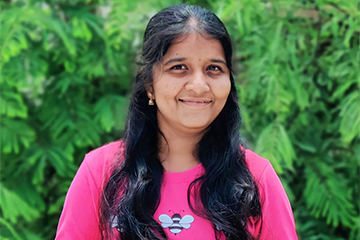 Sravani Govindu is proud to be a part of the first ever batch of Psychology from SRM University-AP. She is always amazed by the influence the faculty and friends had on her character development throughout the years. Sravani recollects how she was an unbothered soul without any focus before joining the university and what she became after experiencing the rhythm of the campus. During her university life, she recognised the value of having a sense of purpose. The continuous efforts from the faculty to provide the right amount of guidance and motivation will forever be a fuelling force in Sravani’s career. She is beyond grateful to the supportive academic community on the campus which became her backbone whenever she was uncertain. The value-oriented course structure at SRM AP encouraged her on many levels. Sravani adores the welcoming aura of the campus and the dynamics between students from various states and countries. She is ready to welcome a new chapter at Greenwich University while holding a bunch of memories from SRM AP.
Sravani Govindu is proud to be a part of the first ever batch of Psychology from SRM University-AP. She is always amazed by the influence the faculty and friends had on her character development throughout the years. Sravani recollects how she was an unbothered soul without any focus before joining the university and what she became after experiencing the rhythm of the campus. During her university life, she recognised the value of having a sense of purpose. The continuous efforts from the faculty to provide the right amount of guidance and motivation will forever be a fuelling force in Sravani’s career. She is beyond grateful to the supportive academic community on the campus which became her backbone whenever she was uncertain. The value-oriented course structure at SRM AP encouraged her on many levels. Sravani adores the welcoming aura of the campus and the dynamics between students from various states and countries. She is ready to welcome a new chapter at Greenwich University while holding a bunch of memories from SRM AP. Meenu Roy is proud to be an SRMite and belongs to the first batch of Psychology at the University. She is in awe of the momentum her personality growth acquired from the eventful campus life. Clubs and other university activities helped her try things beyond her expectations. She enjoyed the whole process of exploring herself throughout the academic venture at SRM University-AP. She finds it fortunate to have a supportive academic ecosystem at her crucial career junction. Meenu is about to pursue her master’s degree from the University of Westminster, UK. Her admiration towards the faculty and friends she had at SRM AP grows further as she continues to go places and prove herself. A part of the campus life and wisdom she enjoyed at the university will stay with her for a lifetime while she keeps on adding value to the recognition of SRM University-AP with her academic intelligence.
Meenu Roy is proud to be an SRMite and belongs to the first batch of Psychology at the University. She is in awe of the momentum her personality growth acquired from the eventful campus life. Clubs and other university activities helped her try things beyond her expectations. She enjoyed the whole process of exploring herself throughout the academic venture at SRM University-AP. She finds it fortunate to have a supportive academic ecosystem at her crucial career junction. Meenu is about to pursue her master’s degree from the University of Westminster, UK. Her admiration towards the faculty and friends she had at SRM AP grows further as she continues to go places and prove herself. A part of the campus life and wisdom she enjoyed at the university will stay with her for a lifetime while she keeps on adding value to the recognition of SRM University-AP with her academic intelligence.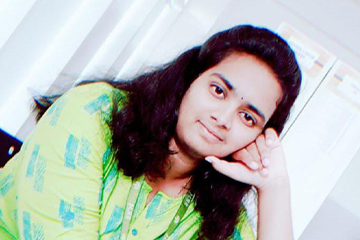 Uha Lakkireddy recently completed her bachelor’s degree in Psychology from SRM University-AP. The tremendous support and motivation from the university have helped her nurture self-confidence and self-satisfaction. Uha noticed how she transformed as an individual from the time of enrolling in the university until the time of graduation. As a psychology student, she was able to grasp several interesting theories which had exciting applications in real life. In-depth details included in the course structure assisted her in the most unexpected but necessary situations. Uha finds it very fascinating that the graduation period has essentially taught her some extremely valuable life lessons. She remembers learning the importance of physical activities in maintaining mental health through Sports Psychology. Uha’s journey as an ardent Clinical Psychology student is taking a huge turn from SRM AP to Greenwich University, UK. She gives all the credit to her faculty and peers, who have always encouraged her to work hard.
Uha Lakkireddy recently completed her bachelor’s degree in Psychology from SRM University-AP. The tremendous support and motivation from the university have helped her nurture self-confidence and self-satisfaction. Uha noticed how she transformed as an individual from the time of enrolling in the university until the time of graduation. As a psychology student, she was able to grasp several interesting theories which had exciting applications in real life. In-depth details included in the course structure assisted her in the most unexpected but necessary situations. Uha finds it very fascinating that the graduation period has essentially taught her some extremely valuable life lessons. She remembers learning the importance of physical activities in maintaining mental health through Sports Psychology. Uha’s journey as an ardent Clinical Psychology student is taking a huge turn from SRM AP to Greenwich University, UK. She gives all the credit to her faculty and peers, who have always encouraged her to work hard.
Continue reading → Chandrika Reddy from BSc Psychology at SRM University-AP is excited to continue her studies in Psychology to the next level (Post Graduation) at Adelphi University, New York. She is among the bright students who have secured admission to global universities abroad. Chandrika ecstatically mentioned the exposure she collected from the carefully laid out curriculum and course structure at SRM AP. Her journey as an SRMite was quite eventful. She had excellent professors, classmates, and friends who contributed equally to her growth. She had various opportunities to get engaged in the activities aligned with the coursework and re-establish her hobbies. Being a student of the first graduating batch of BSc Psychology, Chandrika’s achievement is a motivation to all students. She thanked all the professors and peers for their kind support and encouragement throughout this journey.
Chandrika Reddy from BSc Psychology at SRM University-AP is excited to continue her studies in Psychology to the next level (Post Graduation) at Adelphi University, New York. She is among the bright students who have secured admission to global universities abroad. Chandrika ecstatically mentioned the exposure she collected from the carefully laid out curriculum and course structure at SRM AP. Her journey as an SRMite was quite eventful. She had excellent professors, classmates, and friends who contributed equally to her growth. She had various opportunities to get engaged in the activities aligned with the coursework and re-establish her hobbies. Being a student of the first graduating batch of BSc Psychology, Chandrika’s achievement is a motivation to all students. She thanked all the professors and peers for their kind support and encouragement throughout this journey.

